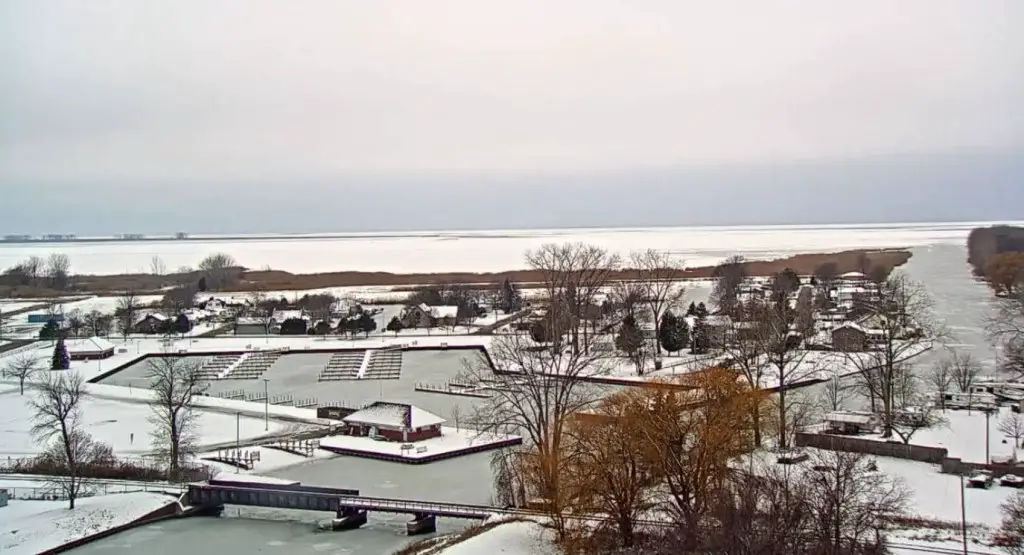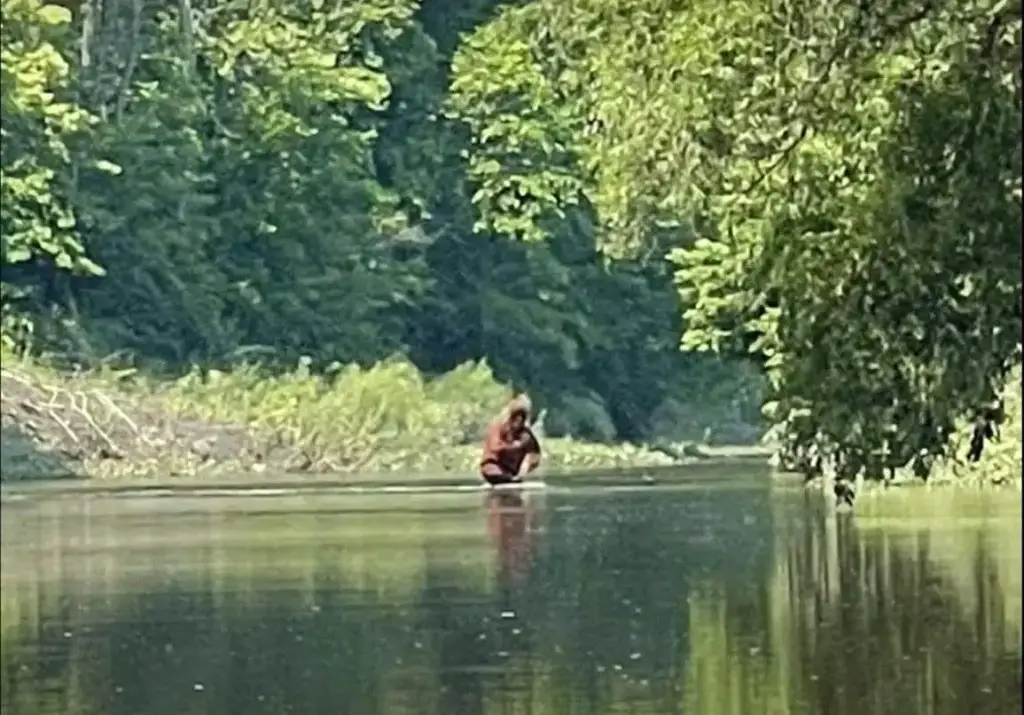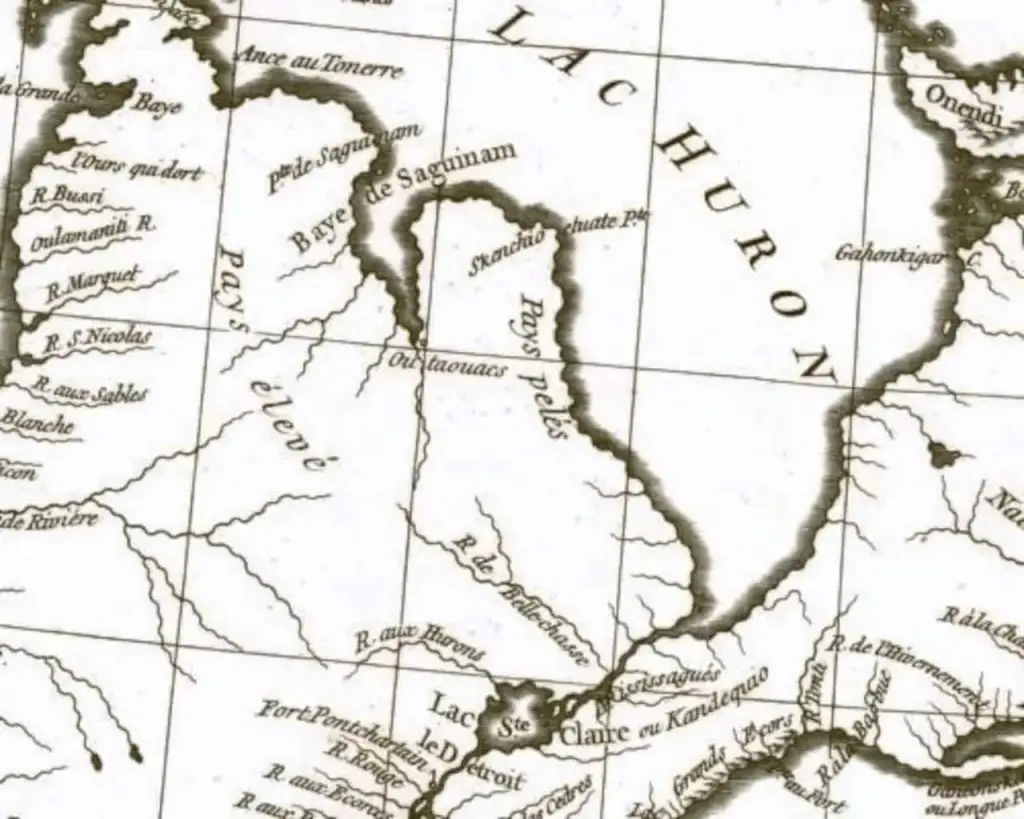Historian and writer Mark Putnam explore ten unique Native American and French words that derive place names in Michigan. A fascinating history of our evolving language.
Wow! I thought I would not get any responses from my last post. To make a long story longer, I note I got more than the average responses, and I will continue a bit with the word “Wanigan.”
What is A Wanigan?
” class=”wp-image-33408″ style=”aspect-ratio:4/3;object-fit:cover;width:800px”/>
On the Cass River during the logging era, a wanigan was a raft with a shack built on it that housed a cook, supplies, and other necessities in storage. It was a place for the river driver to sleep, too.
Today, wanigan basically means the box for storage in a canoe.
The word “Wanigan” is related locally to the Ojibwe word “waanikaan” which means the excavated hole or pit that was used as a place for storage and also as a pitfall.
“Waanike” means to dig a hole and comes from “waan” meaning a hole, plus “-ike” meaning to make plus “-n”, that is a suffix used to form nouns from verbs.
A trap is a “wanii’ige.” Interestingly, a pelt or animal skin is a “-wayaan.”
All these words cause me to relate that food supplies were once stored in a hole or pit, a “waan,” and after finding an animal that fell into the pit and could not escape, Native People took its hide for clothing, etc., and that hide was named for it source the pitfall.
Hide or skin in Ojibwe or from which it was sourced and even later may have been stored.
One may want to know that in German and Dutch “w” is pronounced as a “v,” and “v’ and “f’ are used interchangeably.
Place Names In Michigan? – Lets Explore Sebewaing!

In the Thumb of Michigan, the place name Sebewaing, as I mentioned in the last post, then, likely meant the river of fur, the trap, or the pitfall and also the river of the hole for storage.
The word Sebewaing is related to the place of the cache or the hiding place of the stores of the trapper.
- In German, “fangen” means to trap.
- In Dutch, “vangen” also means to catch or trap.
- In Dutch, “val,” means a trap and “valies” is a valise, box, or suitcase.
- In Latin, “cases” means to fall, and “casus” means to trap.
- In Latin, vallis” means a valley, vale, hollow, or big hole
- In Latin, “vidulus” means a valise or leather trunk, a box or case, and stems from Latin “villus” and “vellus” that and mean a fleece.
- In Latin, “pellus” and “pellis” mean a skin, pelt, or fur!
- In French, a “pelisse” was originally a coat of fur.
- In French, “caisse” means a storage box, traveling suitcase, or valise.
- In Ojibwe, “makak” means a basket or box for storage.
The early European and the Indigenous North American people had a similar development in the words they spoke, and names for hole and trap, which may have universal origins in the nature of the objects described such as an onomatopoeia such as in sizzle. cuckoo and hollow, which the latter has in its sound a reminisce of the echo that is produced by a deep hole.
Hollow almost sounds to me as “high low.”
They used words that seem to be onomatopoeic words that have roots in the original sounds heard near them such as a hole or pit into which one would fall or cascade.
Place Names In Michigan – The Cass River May Mean What?

This brings me to my pinnacle or concluding statement that the place name Cass River, named for General Lewis Cass, was used because his original name root was in the Latin word “casus” meaning the person of the pitfall or the trapper.
The place-name Cass River seems to mean the river of the fur trapper.
Place Names In Michigan – Where is The Country of Fur

It is similar to “La Pays Peles,” which the Thumb of Michigan was once called and means the country of pelts or the home of the fur trapper.
In 1755, the French called the Thumb of Michigan “la Pays Peles,” which means the country of skins I understand in Ojibwe, that “Zibii-wayann-aki” means the river in the fur country, which we see today in the Thumb as the town of Sebewaing. The Cass River was once called the O’Nottaway-Sebewing, too, which certainly meant the O’Nottaway’s river in the country of fur or pelts. That is how the old folks spoke or sang. The more common name for the Thumb in earlier years was the French name La Pays Plat. The English knew it as the Flat Country as the transliteration of the French name was the country flat.
Oh, the thought of those falling and cascading sounds based in the pitfall.
Perhaps, though all this writing is void, empty, or vain and will ultimately give out or wane.
Maybe my thoughts are just idle, meaningless, and hollow!
Oh, but it is exciting to hold the coins and other valuables held at hand in the storage or money box and feel the character of the cashier.
This may be to you stuff that is old . . . but to me, it never gets redundant or old.
Other Works of Mark Putnam


